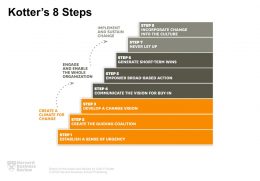
My guest contributor, Gary Borland, continues his series on Management of Change. He is happy to receive enquiries.
Last week, we continued our overview of ‘Kotter’s 8 Step Process for Leading Change’ as an overlay to a Strategic Planning Process. Concurrent and parallel activity is commonplace in major change or transformation programmes.

In this blog, we will look at the next 2 steps step in ‘Engaging & Enabling The Whole Organisation’ which Kotter describes as:
Step 5: ‘Empower Broad-Based Action’
Step 6: ‘Generate Short-Term Wins’
Step 5 – ‘Empower Broad-Based Action’
Embrace challenge
The number of obstacles in the way of change are often seen only when you start asking people – and the best people to ask are not the leaders themselves! Leaders like to believe that they empower others; that they are open to challenge, open to ideas and indeed open to change. While this is true for some, for many it is not true.
The Guiding Coalition need to look for every opportunity to identify and remove obstacles. It could be the belief that change is not possible, that their local leaders aren’t interested in what they think, or perhaps that the systems, structures and processes make it difficult to do things differently. Successful empowerment involves people believing they have permission to stop activities that do not add value, relentlessly purging the non-essential.
Measure it!
Empowerment without measurement is abandonment. Empowerment is neither about creating a free-for-all, nor abrogating responsibility. What the organisation does and the way it does it, needs to be integrated with the change or transformation programme. But it’s all too easy for leaders to arm-wave about non-specific risk, which can often be covering their own insecurities. A good question to keep asking is “what is the cost of doing or not doing this, and what price will be paid as a consequence?”. Transformation is not a ‘zero sum’ activity.
Step 6 – ‘Generate Short-Term Wins’
It’s one thing to enrol people in a big future and big transformation programme, but it’s quite another to keep them enrolled. Enrolment is an on-going process. One of the motivators for people to stay engaged is evidence that what they are committed to, and the sacrifices they are making, are worthwhile and contribute to unlocking our vision.
The Guiding Coalition need to look for, celebrate and communicate things that are contributing to on-going success. Those short-term wins need to be visible and real, unambiguous, relevant to what we do and where we’re going. Most importantly, these wins should be celebrated. Integrating short-term wins into on-going communications forms a key part of the communications strategy and supporting plans.
Next week we will look at maintaining focus and momentum, and embedding change into the culture.
